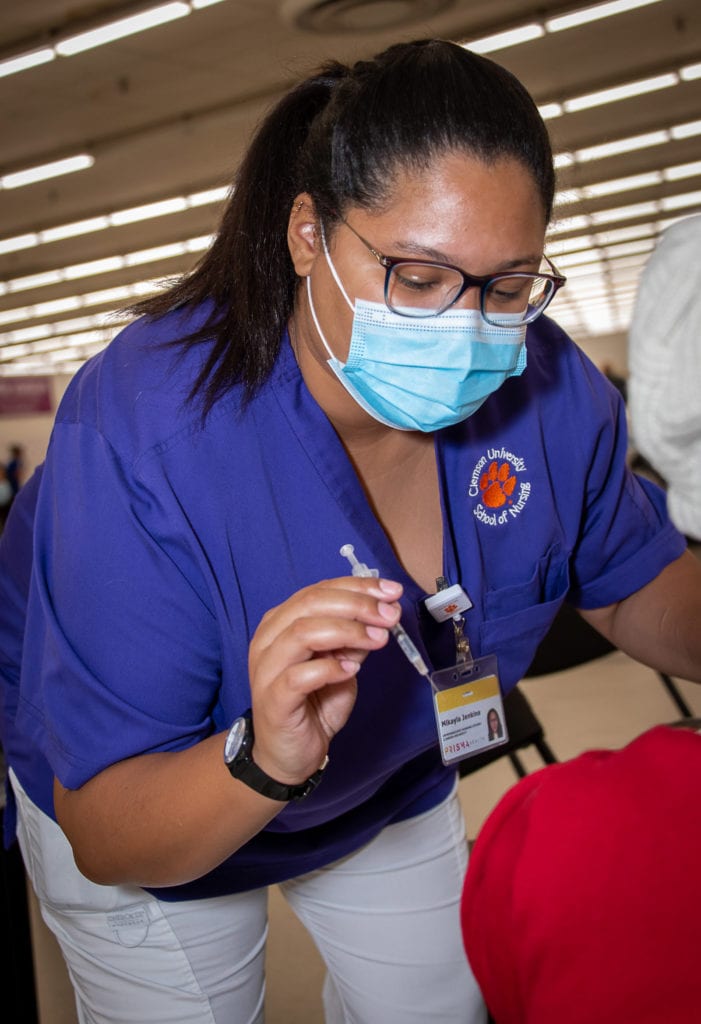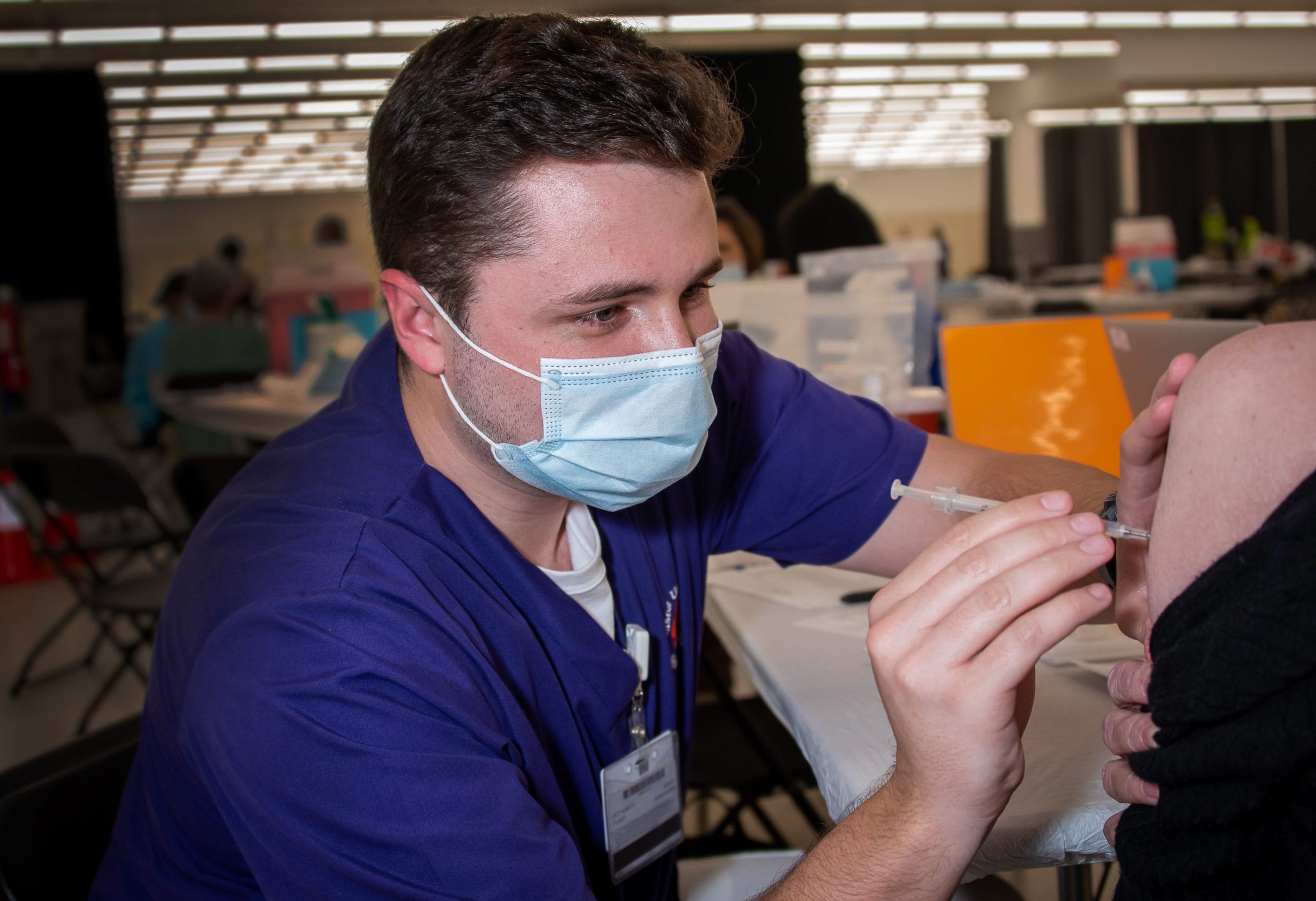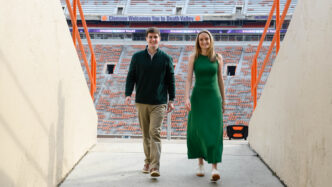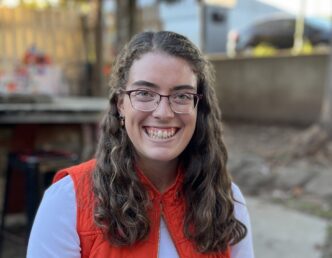Not many nurses can say they were students during a pandemic, helping to vaccinate the public against a novel disease. But 278 Clemson nursing students can make that claim– helping administer COVID-19 vaccinations at Prisma Health vaccination clinics in Greenville and Seneca.
Many students taking part already see the experience as knowledge they will pass on to children, grandchildren and future generations of health care employees. Annemarie Piccione, a junior nursing major, is one student who already feels the weight of history in the actions she and her fellow students have taken to help end the pandemic in the Upstate.
“This is making history, and I get to be a part of it,” said junior nursing student Annemarie Piccione. “When I look back on my nursing education, I get to say I was a part of a pandemic and made an impact on my community in helping to end it.”
When contacted by Prisma Health Senior Vice President and Chief Nursing Officer Carolyn Swinton, Kathleen Valentine, Clemson School of Nursing Director and Clemson University Chief Academic Nursing Officer, worked with faculty on how Clemson Nursing students could be involved. Since January 14, Clemson Nursing students have been helping to administer COVID vaccinations, as a part of their clinical education and under the supervision of their clinical faculty or preceptor.
“During this COVID-19 pandemic it is crucial that we collaborate with Prisma Health and activate our nursing students to meet the needs of our local community,” Valentine said. “The opportunity to provide this vital public health nursing care will become an enduring memorable event as these students progress throughout their career. Prisma Health recognizes the magnitude of this collaborative effort as well.”
Clemson and Prisma Health have been working together for many years on health and education collaborations. This is another example of one of the many ways the two institutions are partnering together.
“As an academic health center, we are navigating this pandemic constantly thinking of ways we can engage students, engage our community, and create symbiotic experiences such as this one to educate our future workforce,” said Executive Director for Student Affairs for Prisma Health, Dr. Christen Hairston. “We love Clemson Nursing and are so appreciative of their engagement and immediate, ‘Yes,’ when we made the call.”

Just like their regular clinical rotations, the students start their day early. They are onsite and ready for day-of orientation at 6:30 a.m. Upon arrival, there are often around 100 people lined up at the door. Students are paired up with Prisma Health nurses and given instructions about administering the vaccine and possible symptoms that may be present in patients. Vaccinations begin at 7 a.m.
Junior Meg Gurley likened the arrival on these “front lines” to entering the fray in war, although this war was an invisible enemy in a clinical setting. Piccione said that any nervousness that she may have felt upon arrival quickly dissipated when she administered the first vaccine.
“When my friend and I pulled up to the vaccination clinic, and I saw that long line of people waiting for their vaccines, I was nervous,” Piccione said. “But after that first shot, I became energized because of the impact I knew my work was having.”
Students are not only performing a service for their community, but they are also practicing additional skills that aid them in their careers, such as patient interaction and injections. Junior Jade Huang got to put into practice something a professor told her the first day of her clinical rotations: treat your patients like one of your family members.
The students got a brief glimpse into their patients’ lives as they talked to those who were getting vaccinated. Some people told the students they hadn’t seen their family since March, and they were getting the vaccine so they could more safely be around loved ones. Students said they were thanked many times for their help.
“It made me feel so helpful,” Huang said. “I felt like I was making a difference and doing something for my community. This experience made me feel like a real nurse.”
And with students vaccinating 80 to a little more than 100 people each time they visit the clinic, they are getting a lot of practice giving injections. After having virtual clinical rotations during the last academic year, senior Tyler Bowie was excited to finally do something to help the community and take care of others.
“Since the very beginning, I wanted to find ways to be in the hospital and help, and the opportunity with the vaccine clinic made that possible,” Bowie said. “You can’t describe it. Being there helped me grasp the magnitude of the pandemic and its effect. You read about the numbers, but when you’re there at the clinic, it makes it more real.”
In addition to the School of Nursing students, Clemson University’s College of Behavioral, Social and Health Sciences has also had faculty volunteers from the Department of Parks, Recreation and Tourism Management and graduate student volunteers from the Department of Psychology to help with non-clinical activities at the vaccination sites. Nursing students will be vaccinating at the clinics throughout this semester.
The Clemson University College of Behavioral, Social and Health Sciences (CBSHS) was established in July 2016. CBSHS is a 21st-century, land-grant college that combines work in seven disciplines – communication; nursing; parks, recreation and tourism management; political science; psychology; public health sciences; sociology, anthropology and criminal justice – to further its mission of “building people and communities” in South Carolina and beyond.







